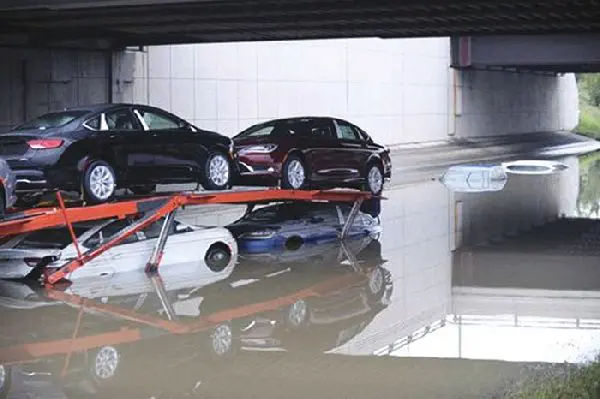
DETROIT – While thousands of residents across Southeast Michigan sustained damage to their homes from last week’s record breaking rainfall, motorists were also severely impacted by the disaster.
On Monday, August 11, thousands of motorists were trapped along streets and freeways during their commute home, when their vehicles stalled after rising waters quickly flowed into their engines, air intakes and passenger compartments.
The days that followed could be described as a nightmare for many drivers. Hundreds of vehicles were left stranded and unattended on the sides of roads as drivers waited from three to four days for tow trucks to take them away.
Dearborn’s AAA office alone reported that more than 1,000 vehicles were in need of assistance as a result of the rainfall. Many AAA members were put on a waitlist based on a first come-first serve basis.
Auto repair shops have been swamped and overcrowded with customers who are hoping to get their vehicles repaired.
“I have never seen anything like this before,” said Abdallah Siblani, owner of Craft Car Care in Detroit. “Usually we may have one or two engine jobs in a week, but since the storm hit we have been having them every day.”
Siblani said engine repair jobs vary in price depending on the year and model of the vehicle and extent of the damages. This week, he had a customer with a 2014 Dodge Charger that suffered water damage from the flood. Obtaining an engine for the vehicle has been difficult and could cost the customer up to $7,000.
He said outside of engine jobs, many vehicles have also needed repairs in other areas.
“There are some people who have had their cars flooded from the inside and have needed electrical repairs,” Siblani said. “Many bumpers have also been damaged because drivers went through puddles of water. It’s pretty bad.”
Many insurance companies do cover water damage, but it depends on the type of insurance policy the motorist has. Flood damage coverage is only offered as an option, thus not every vehicle is covered. Some companies have even been refuting claims if a motorist knowingly drove through impacted areas.
Very few customers have been lucky enough to have only needed services that involves emptying the car cylinder and replacing the spark plugs to re-ignite the engine.
While those motorists may have caught a break, mechanics warn that vehicles that have suffered extensive water damage will more than likely prove problematic for a driver in the long run, as mold begins to develop over time.
Billal Harb, manager at Burt Auto Repair in Detroit, said residents should avoid purchasing used vehicles that have suffered extensive water damage. Long term effects of the vehicle may include stalling, electric problems and computer problems.
“A lot of people will go to the auction and buy a flooded car for a very cheap price, but they are going end up having problems in the long run,” Harb said.
Harb added that the vehicles his collision shop have worked on in the last week have ranged from those needing easy fixes to those requiring substantial repairs. Inquiries have included Toyota, Chrysler, GM and Ford vehicles.
“They are all the same when they get flooded,” Harb said. “You can’t blame it on any particular company. It all just depends on how extreme the flooding was. If the water damage has gotten inside of the car, it would be better to get a new car entirely, because it will become impossible to dry up and get rid of the smell caused by the corrosion.”
This week, Attorney General Bill Schuette released a consumer alert warning residents across the country to beware of buying used vehicles that have suffered water damage.
The state suspects that many motorists will be looking to inundate the market with used vehicles that were impacted by the flood.
“Vehicles with flood damage can be shipped across the country in a matter of days and appear for sale on the Internet or at car lots far away from the storm area, without any mention of the damage,” Schuette said in a statement. “Floods can damage vital parts of a car, including airbag sensors, brakes and electrical system—and the damage may not show up right away. Don’t put your hard-earned money into a flood-damaged lemon.”
The National Salvage Vehicle Reporting Program, an independent third party standards body for the federal government’s comprehensive database on vehicle damage history, reports that thousands of water-damaged vehicles had been sold at auctions across the country following Hurricane Sandy in 2012 and the Colorado floods of 2013. The agency is preparing for a similar outcome following the floods in southeast Michigan.
Schuette warned that customers should have their vehicles thoroughly inspected by an automotive technician before a purchase occurs. Obtaining the VIN number of the vehicle and checking its history is another effective avenue, although many times water damage could go unreported.
The state also warns to look for a musty or “over-perfumed” smell in the interior or signs of mold or mildew. Checking for mud or residue in places like under the carpeting or in the trunk can also be revealing. Customers should also be suspicious if a vehicle hesitates to run or shows signs of premature rust or corrosion in abnormal areas, such as the screws on the console.
The state warned that an auto dealer who omits information regarding water damage could be penalized. Costumers are urged to contact the secretary of state to file a complaint with the Regulatory Monitoring Division at:
1-888-SOS-MICH.






Leave a Reply